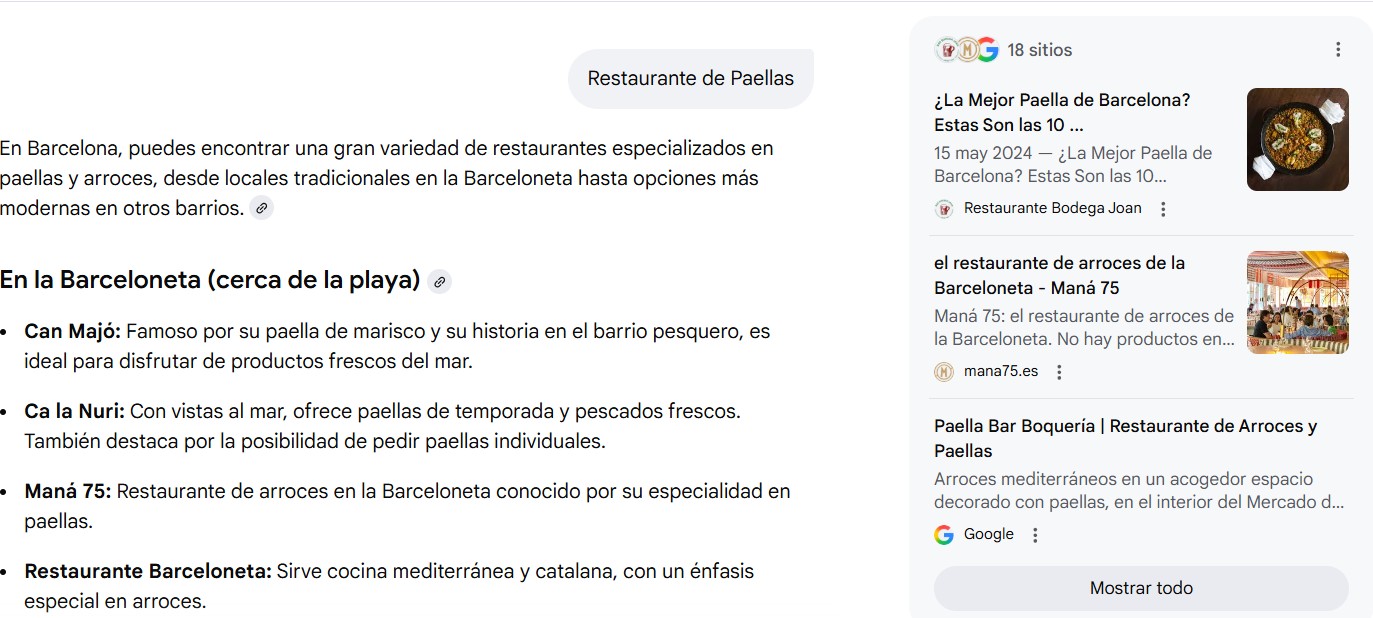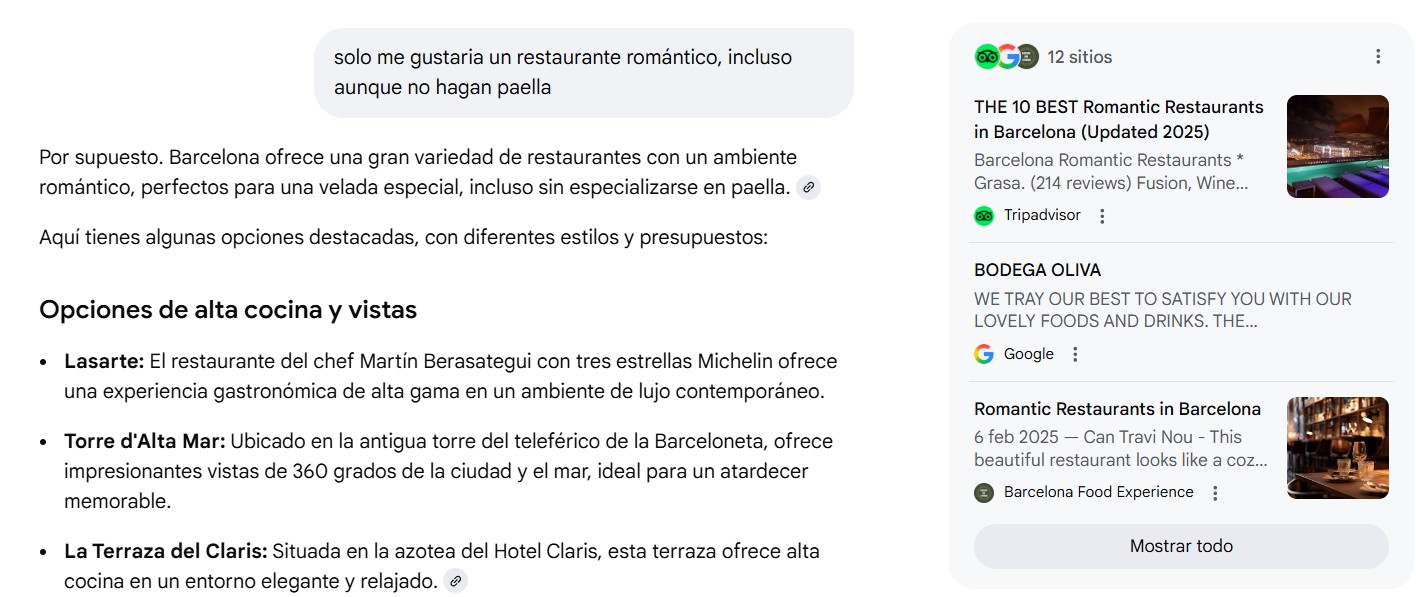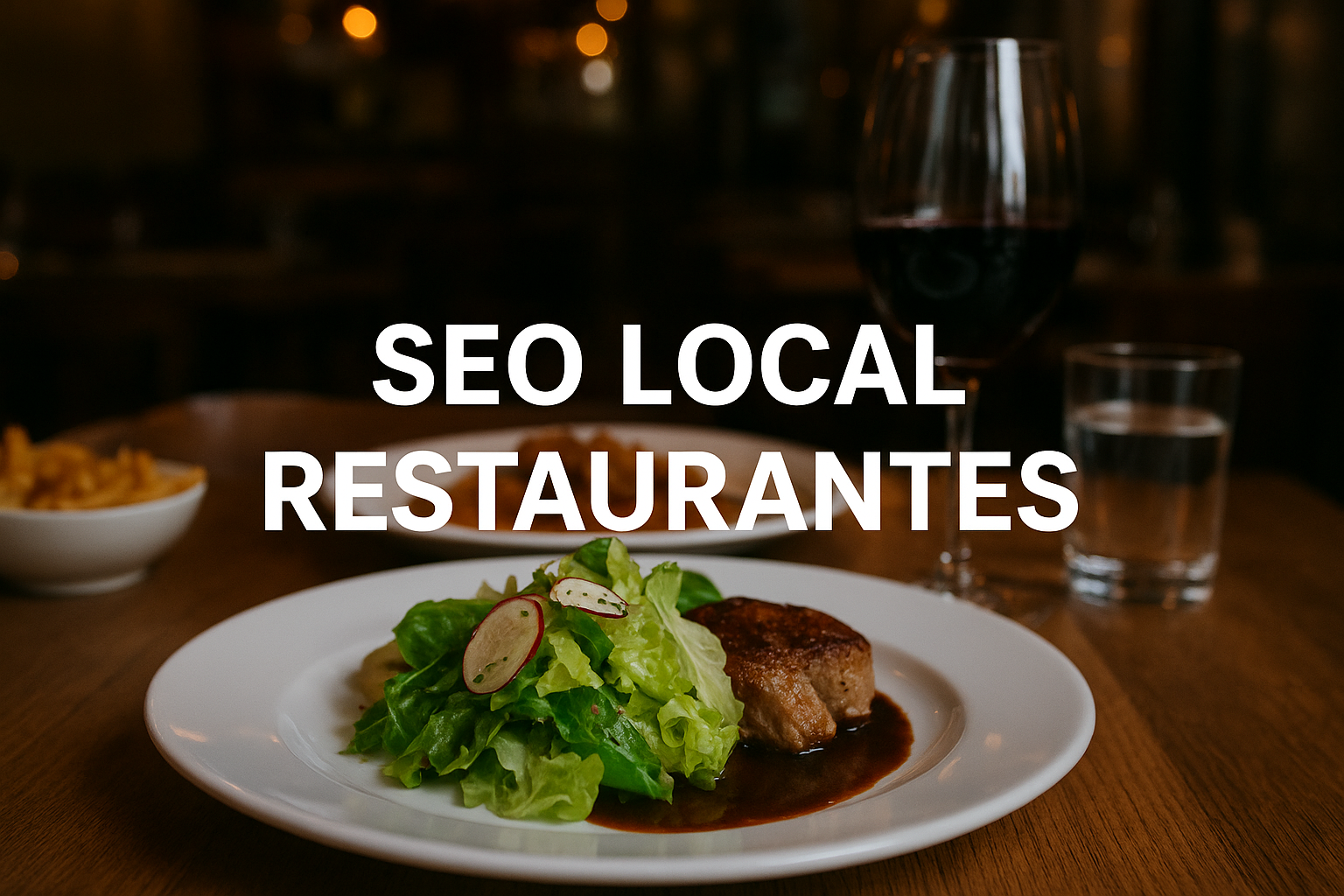How to Position Your Restaurant in the Conversational AI Era and Master Local SEO
Gastronomy, that ancient art of delighting palates, is today at the epicenter of an unprecedented digital revolution. In cities with a culinary scene as vibrant and competitive as Barcelona, a restaurant's survival and success are no longer measured solely by the excellence of its cuisine or the warmth of its service, but by its ability to converse with artificial intelligence.
Gone are the days when a simple manual Google search dominated the landscape. Today, potential customers increasingly interact with chatbots, voice assistants, and the innovative "AI Overviews" that platforms like Google are implementing.
These systems don't offer a cold list of links, but a conversational, predictive, and personalized experience. Users no longer "search," but "ask": "Which Italian restaurant with a terrace in Gràcia do you recommend for tonight?", or "I need a tapas restaurant with good reviews and gluten-free options in the Eixample." AI processes this question, analyzes millions of data points, and, in a matter of seconds, offers a direct recommendation.

We will explore how AI operates, why brand mentions and collaborations are the new "link building" for gastronomy, and how your presence in the SERP (Search Engine Results Page) becomes your most valuable storefront. If your restaurant seeks to transcend the noise and become a digital benchmark, this is your map.
How Do AI Results Operate?
Artificial intelligence has radically transformed the way users access information. For the HORECA sector, this metamorphosis is particularly relevant. Chatbots and voice assistants not only interpret natural language but also understand the user's underlying intent. For example, when someone types "Find me a cozy restaurant for an anniversary dinner in the Gothic Quarter." AI doesn't search for "Barcelona restaurant"; it searches for "romantic restaurants," "restaurants with an intimate atmosphere," "highly-rated restaurants for special occasions" in the Gothic area, and then filters by reservation availability or mentions in reviews.
If your restaurant is synthesized in an "AI Overview," you gain premium visibility. AI will highlight the key points that make you relevant to the user's query, often directly extracting from your structured data or review mentions.
The Google My Business Listing: Essential for AI
If AI is the new search engine, your Google My Business listing is the fuel. It is the primary source of truth that AI consumes to understand your restaurant. AI not only "reads" data; it also "interprets" visual content. Attractive dish images, the ambiance of the venue, and the team increase appeal and trust.
Every field in your GMB listing is an opportunity to communicate to AI the essence of your business and the specificity of your offering.
- Categories and Attributes: AI uses GMB categories (e.g., "Paella Restaurant," "Tapas Bar," "Fusion Cuisine") to accurately classify your business. Attributes like "terrace," "Wi-Fi," "vegan options," or "wheelchair access" are crucial filters for AI. If a user asks for a "restaurant with a terrace in Barcelona" and you have that attribute activated, your restaurant enters AI's radar.
- Quality Photos and Videos: AI not only "reads" data; it also "interprets" visual content. Attractive, high-resolution dish images, the cozy atmosphere of the venue, the facade, and the human team increase appeal and trust. A visually rich profile communicates professionalism and experience.
- Menu and Reservations: Link directly to your updated menu and an integrated reservation system (like Google Reservations). AI values ease of conversion and immediate action for the user. A visible menu and simple booking are points in your favor.
Active Review Management: Your Reputation for AI
Reviews are not just customer opinions; they are the most valuable currency for AI in evaluating your reputation.
- Value for AI: Reviews are the most powerful testament to the customer experience. AI processes them to identify patterns, highlighting your strengths (e.g., "friendly service," "romantic atmosphere," "best paella in town") and also detecting potential weaknesses.
- Professional and Personalized Response: Argue that responding to all reviews (positive and negative) demonstrates a genuine commitment to customer satisfaction. AI interprets this as an active, attentive, and, fundamentally, trustworthy business. A lack of responses can be perceived as disinterest.
Example: Consider a restaurant in Poble Sec with 200 reviews averaging 4.7 stars, where the owner responds to 90% of them with personalized and genuine messages. This business will have a decisive advantage over another with 500 reviews averaging 4.0 stars and no active management. AI prioritizes the quality and management of reputation over mere quantity, as it seeks the best user experience.
Structured Data (Schema Markup)
For AI to "understand" your restaurant unambiguously, it must speak its language. That precise and universal language is structured data.
What it is and why it's vital?
Schema Markup is semantic code that tells search engines (and, therefore, AI) the exact meaning of the information on your website. It's not just text; it's a tag that defines "this is the restaurant name," "this is a menu item," "this is the average rating."
- Schema Types for Restaurants: Delve into types like Restaurant, MenuItem, Review, AggregateRating, OpeningHoursSpecification (opening hours), PriceRange (price range). Implementing these schemas precisely ensures that AI doesn't have to "guess" your data.
- NAP Consistency: AI cross-references your Name, Address, and Phone (NAP) from your website (via Schema) with your GMB and all online directories. Even a minor inconsistency (a "St." instead of "Street," a phone number with or without hyphens) creates doubt in AI and can drastically penalize your visibility. It's a sign of unreliability.
Impact on AI Results
AI uses this structured data to directly populate its "AI Overviews" or to answer specific user questions. If you ask AI "What is the average price of a restaurant in the Eixample?", and your website has the PriceRange well-implemented, AI can directly cite you as the source of that information.
Imagine a restaurant in El Born that implements Schema.org/MenuItem for each dish on its menu, including ingredients, allergens, and price. When a user asks AI "Where can I eat esqueixada in El Born that doesn't contain onions?", if your dish is detailed with this precision in the Schema, AI could recommend you with an accuracy that would surprise the diner, connecting them directly with your offering.
The Content Strategy: Specialization and Gastronomic Authority
In a saturated market like hospitality, being "just another restaurant" is, in essence, being invisible. AI, in its quest for the most relevant and reliable answer, seeks out benchmarks and experts. A restaurant in Valencia (or even in Barcelona) that invests in a blog with articles on "The true history of paella," "Our secrets for the best soupy rice," or "Seasonal fish in our recipes" is communicating a clear message to AI: "We are the authority on rice dishes." This valuable content builds a digital identity.

Dedicate specific pages to your signature dishes, narrate the chef's philosophy, highlight the origin of your ingredients, or the story behind your establishment.
External Authority and Reputation
AI doesn't just read your website; it listens carefully to what the digital world says about you. This is where external collaboration and brand mentions become invaluable. Appearing in gastronomic directories and review platforms like TripAdvisor, TheFork, Yelp, Gambero Rosso, or even guides like Michelin (regardless of stars), validates your existence and quality. AI cross-references and weighs these sources to build a trust profile.
Mentions that qualify you as "the best restaurant in...", "a must-visit for...", or "a culinary discovery..." (even if they come from smaller blogs, influencers, or social media comments) are a powerful signal for AI, as it doesn't just look for links; it seeks a consensus of quality and a solid reputation.
That's why you should actively encourage your customers to participate on these platforms. These organic reviews, mentioning specific dishes or experiences, are gold for AI.
Collaborations with Industry Blogs and Magazines
This is where quality journalism and SEO converge. Getting your restaurant reviewed or mentioned in leading gastronomic blogs, specialized magazines, tourist guides, or even local newspapers is a goldmine for your digital authority. A restaurant without a Michelin star may not appear in an AI's "fine dining" section. However, if it's mentioned by "Time Out" magazine in its list of "The 10 best brunches in the city" (with a link to its website or GMB), or if an influential food blogger ("BcnFoodie") dedicates a post praising its local cuisine, AI will pick up this external validation signal.
Proactivity is fundamental. Contact these media outlets and professionals. Invite gastronomic journalists, bloggers, or culinary influencers. Offer samples of your cuisine, tell them your story, present a special event or a new seasonal menu. The goal is not just a link; it's an honest review and a quality mention that elevates your status as a benchmark. AI will value an organic and authentic mention more than a forced or artificial link.
The SERP as Your Main Showroom
Despite the growing conversation with AI, visibility in traditional search results (SERP) remains crucial. Top rankings not only attract clicks; they confer authority and trust that AI values and replicates.
Google's algorithms (and, by extension, AI) have been trained to understand that the first results are usually the most relevant and reliable for a query. If your restaurant consistently ranks in the top positions for relevant searches ("vegan restaurant Barcelona," "tapas near Sagrada Familia"), AI will interpret this as an unequivocal sign of authority and quality. Search results for phrases like "best [type of food] restaurant in [area]" often include GMB listings and blog articles that list the "best." Being present in these lists gives you double validation for AI, reinforcing your position as a benchmark.
The GMB Listing as the "Preferred Link" in Spain
This is a notable phenomenon in Spain. We observe that, often, "AI Overviews" and voice assistants, when recommending a restaurant, link directly to its Google Maps/GMB profile, rather than to a magazine article or website. AI understands the user's final and pragmatic intention for a restaurant. Diners seek actions: viewing the location on the map, getting directions, consulting the full menu, calling, or making a reservation. The GMB listing offers all this information instantly and actionably.
Mentions in magazines, blogs, and other specialized media are crucial for creating the "authority" and "credibility" that convince AI you are an excellent choice. But the GMB listing is the "action point" that AI presents to the user because it is the richest and most functional source for the final transaction. Both elements are necessary and complementary. It is not about choosing between one or the other, but about integrating them into a cohesive strategy.
The Future is Conversational, Is Your Menu Listed?
The convergence of artificial intelligence and local SEO is redefining the gastronomic landscape. It is no longer enough to have a digital presence; an active, informed, and specialized strategy is required to converse with the algorithms that guide the diners of the future. From meticulous optimization of your Google My Business listing and the implementation of structured data, to building a solid reputation through reviews and collaborations with industry media, every step is fundamental.
Restaurants that ignore this evolution risk becoming invisible in an increasingly AI-driven market. Those who embrace change, who understand how specialization and authority build machine trust, will be the ones who not only fill their tables but also become the culinary benchmarks of tomorrow.
In an environment as dynamic as Barcelona, the difference between being an AI discovery or a forgotten restaurant in the digital immensity lies in a well-executed local SEO with AI strategy.
Do you feel that your restaurant has an exceptional menu, an unparalleled ambiance, or a fascinating story, but fails to stand out in artificial intelligence results? As a freelance SEO in Barcelona, I am here to help you decipher the algorithms and position your business on the menu of the future. Together, we can audit your digital presence, optimize your Google My Business, implement structured data, design a specialized content strategy, and build that external authority that AI seeks.
Let's talk! Contact me today.
